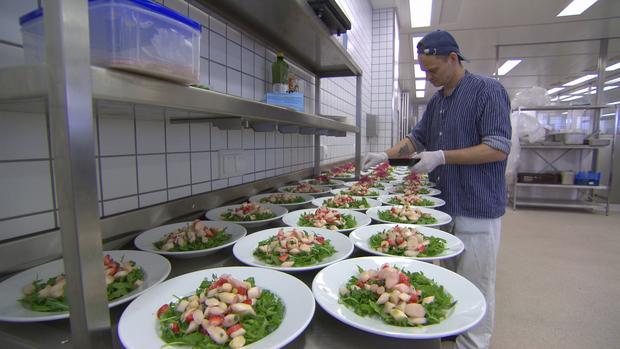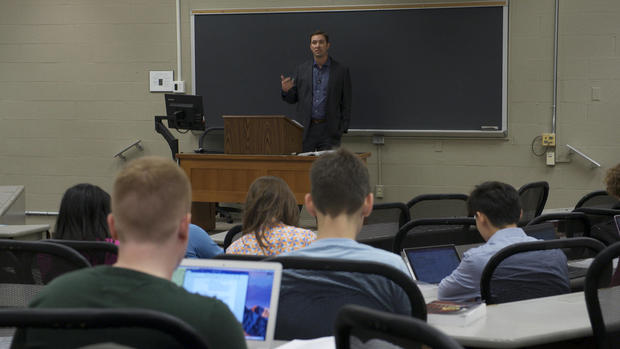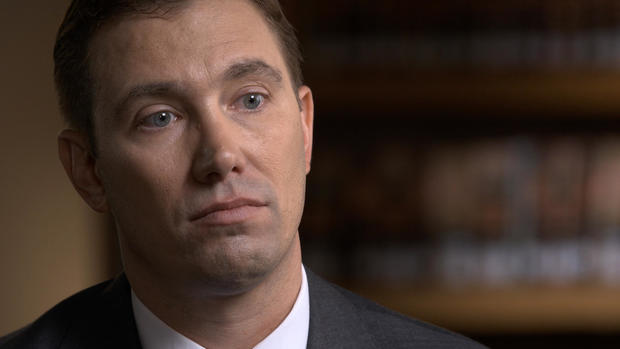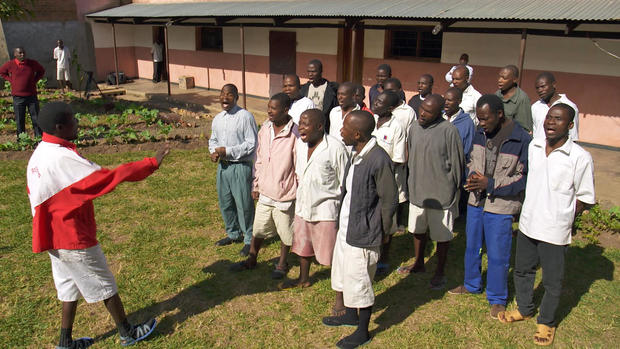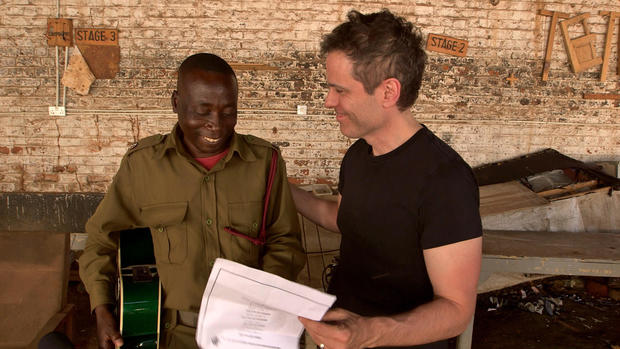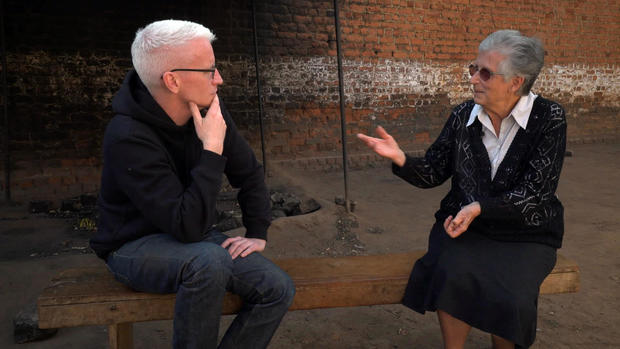60 Minutes Presents: Behind Bars
Not many issues can unite Democrats and Republicans. But criminal justice reform is one of them. After thirty years of being Tough on Crime in the U.S., no other nation incarcerates more of its citizens than we do. We have 5 percent of the world's population, but 25 percent of its prisoners. The cost of housing all those inmates: $80 billion a year.
Crime and Punishment
As we first reported in 2016, American politicians and prison supervisors are looking for new ideas - in Germany. The main objective of German prisons is rehabilitation, not retribution. Germany spends less money on prisons, but gets better results. Their recidivism rate is about half the U.S. rate. We wondered if Germany had found a key to prison reform. So we visited three German prisons, but our trip started in a small resort town about 100 miles north of Berlin.
When the weather's warm, the lakeside town of Waren, Germany, attracts families and tourists. We found Bernd Junge there with his sister and niece -- out for a stroll, eating ice cream sundaes -- an innocent scene if ever there was one. But Junge is a convicted murderer, sentenced to life in prison for a contract killing. He shot a woman to death in cold blood. We spoke with him by the lake.
Bill Whitaker: This is part of your sentence. This is part of your punishment?
Bernd Junge: Well this is about being reintegrated into a normal life and that means rehabilitation and all that, so for me, yes, this is part of it.
Bill Whitaker: This doesn't look much like punishment.
Bernd Junge: Yes, well that's the German fairy tale.
After 15 years in prison he's earned weekend leave for good behavior. He's on track for early release. In Germany, 75 percent of lifers are paroled after 20 years or less.
Joerg Jesse: If someone says to himself it's a German fairy tale, if he doesn't commit any crimes anymore after release, it's OK. He can think about his imprisonment, what he wants.
Joerg Jesse is a psychologist by training. He's now director of prisons in Mecklenburg-Western Pomerania, a state in north Germany along the Baltic, about the size of New Hampshire. There are rich fields here, brilliant sunsets, and Waldeck -- the maximum-security prison where Bernd Junge has served his time.
Bill Whitaker: Should he have a future for himself? He took a life.
Joerg Jesse: Yes, he should.
Bill Whitaker: He should?
Joerg Jesse: He should.
Jesse invited us to Waldeck to show us how the German system works.
Joerg Jesse: The real goal is reintegration into society, train them to find a different way to handle their situation outside, life without further crimes, life without creating new victims, things like that.
Bill Whitaker: Where does punishment come in?
Joerg Jesse: The incarceration, the imprisonment itself is punishment. The loss of freedom, that's it.
Bill Whitaker: I think Americans think crime and punishment. You say punishment is not even part of the goal of the German prison.
Joerg Jesse: No.
Bill Whitaker: At all?
Joerg Jesse: Not at all.
So life inside prison mirrors life outside as much as possible. Germans call it "normalization." It starts with small prison populations. Low-level offenders get fines or probation. Prison is reserved for the worst of the worst -- murderers, rapists, career criminals. We were surprised how quiet and peaceful it was inside Waldeck. We wondered where all the inmates were. It turns out they were relaxing outside on this sunny day.
Bill Whitaker: This is unbelievable. You're in for murder and you have a key to your cell.
Cells have doors, not bars. It's for privacy. Inmates can decorate as they please. We saw Joerg Muehlbach playing video games in his cell. He told us he was convicted of large-scale cocaine trafficking and gun possession. He was sentenced to seven years.
Bill Whitaker: Compared to cells in the United States this is quite luxurious.
Joerg Muehlbach: Yes, it is comfortable here. As a prisoner here it's alright.
He says being separated from his family makes prison hard, not the conditions. He has a private bathroom and things that would give American prison guards the jitters.
Bill Whitaker: You have darts. You've got a letter opener. You have legs on the table that you could break off and use as a club. You've got quite a bit of freedom in here?
Joerg Muehlbach: Gosh, I haven't even thought about that. Here this is normal.
Muehlbach's day is normal too. He gets up and goes to work in the prison kitchen. After his shift, there's R&R -- darts in the common room, beach volleyball in the yard. There's a lot to do, he told us.
Joerg Muehlbach: Painting course, pottery, soccer, gym, crocheting.
Bill Whitaker: Painting and crochet?
Joerg Muehlbach: Yes, painting and crochet. And in crochet we make hats, oven mitts, whatever you need.
We visited several German prisons and were amazed how laid back everybody seemed at each of them -- prisoners and guards. Heidering Prison outside Berlin is as clean and bright as a Google campus. The prison is surrounded by fences, not walls, so inmates can see the outside world. The prison uniform? Street clothes. For the inmate who finds this too stressful, there's yoga.
At old facilities like Tegel in Berlin, or new ones like Heidering, the focus is on humane treatment and rehabilitation. Prison guards are key. They're well paid and highly trained -- they spend two years learning psychology, communication skills, conflict management. Jesse calls them "calm down" experts.
Joerg Jesse: Calming down, calming down, calming down. Not showing power too much. Not showing guns. Not showing weapons.
They use solitary confinement, sparingly. Jesse says there's little violence in German prisons.
Bill Whitaker: How do you explain that?
Joerg Jesse: If you treat them as if they are your enemy, they will react as enemies. They will react as dangerous.
Bill Whitaker: In fact, many of them are dangerous. We we're up there on a row where everyone you ask was in for murder, murder, murder.
"If you treat them as if they are your enemy, they will react as enemies. They will react as dangerous."
Joerg Jesse: They're all human beings, and they know a violent manner. And we do exactly the other way around. "Don't be aggressive." Show them that there is a different kind of conversation possible.
The conversation starts right away. It's based on therapy. Psychologists make an initial assessment of all new inmates and devise personalized prison plans for them: recommendations for counseling, classes, vocational training and work. Inmates who follow the plan earn greater freedoms and early release.
Joerg Jesse: We cannot see the sense in just locking people up for their whole lives. Your prisons will fill up and you'll have to build new prisons and so on and I think that was the situation in the U.S.
With more than 2 million inmates in U.S. prisons, more Americans are coming to Germany seeking solutions.
[American tour: It's like a dorm. This would be a nice dorm room for the Ivy League.]
We joined U.S. prison and law enforcement officials on this tour in Berlin. Connecticut Governor Dannel Malloy was part of the group. He was impressed by what he saw.
We joined U.S. prison and law enforcement officials on this tour in Berlin organized by the Vera Institute of Justice and John Jay College of Criminal Justice. Connecticut Governor Dannel Malloy was part of the group. He was impressed by what he saw.
Dan Malloy: I can tell you, they have a lower crime rate than we do. They have a lower recidivism rate than we do, and they're spending a lot less money on jails.
Bill Whitaker: In the U.S., we've got much greater access to guns. We've got-- race as a factor and ethnicity as a factor. Are the things being done here directly transferrable to the United States?
Dan Malloy: I think there are many things that are transferrable. That doesn't mean that it's a perfect fit. But I think we have to challenge ourselves to do better.
Bill Whitaker: This doesn't have the same vibe, doesn't feel like the prisons in Germany at all.
John Wetzel: Little bit more intense, maybe.
Bill Whitaker: Little bit more intense.
John Wetzel is Pennsylvania's Secretary of Corrections. Five years ago, he went to Germany looking for ideas to improve his prisons. He showed us around Graterford, outside Philadelphia. It's the largest maximum-security prison in Pennsylvania -- almost 3,000 prisoners are packed in here. We were walking through an 80-year-old cell block when this inmate approached. He said he was a low level drug offender.
Prisoner: Sometimes, it be leaking on the block, people dying in their cells, the water stinks. Did you smell the water? Water smells like it's coming out of the sewer hole.
John Wetzel: You're preaching to the choir. I've done as much as I could for...
Prisoner: I mean, for real, there ain't nothin' but poor black and Latino people in the jail. It's bad in here man, its bad.
John Wetzel: Yeah? I mean look around.
Prisoner: It's bad.
Wetzel started as a prison guard three decades ago. Back in 1980, there were 8,000 inmates in the state. Today, there are almost 50,000. Physical and sexual assaults are a fact of life. At Graterford, there are more than 600 lifers.
John Wetzel: Pennsylvania's a state where life means life. So, if you're doing life here you're not gonna be walking around a park-- eating sundaes with your family.
When Wetzel was in Germany, Joerg Jesse gave him a tour of Waldeck.
Bill Whitaker: You were skeptical.
John Wetzel: It almost sounded like Disneyland. "Oh, there's very few inmates. Inmates have their own keys and everybody gets along and everything's hunky-dory." I mean, who's buying that story? Not me.
By the end of his visit, Wetzel was buying it. He started implementing some of the things he saw in Germany, like more intensive staff training, greater freedom for inmates with good behavior and programs to help them reenter society.
Bill Whitkaer: We, the American public, called for tougher sentencing, throwing away the key. Are we there for this more lenient approach?
John Wetzel: I think our culture, we don't want to think lenient. We don't want to think soft. We got here by being tough on crime. I think we're getting away from it by being smart on crime, and smart on crime happens to be more lenient.
Sometimes Germans think their prisons are too lenient. But the system is mandated and protected by the country's highest court. There are problems. They have gangs. They have drugs. They've seen signs of Islamic radicalization. They try to counter it all with counseling.
But there are inmates deemed too dangerous to release. They wind up in something called preventive detention. At Berlin's Tegel prison we met Chris Templiner. He has spent the last 20 years not knowing when or if he'll ever get out.
Chris Templiner: They think I'm dangerous so what can I say? What can I show them? I don't know.
Bill Whitaker: You did bad things?
Chris Templiner: Really bad things, yes.
He wouldn't tell us his crimes and German privacy laws kept us from finding out. His life is confined to this well-appointed, apartment-like building. Look around, this is life in prison for Germany's worst offenders.
Bill Whitaker: You expect to be here until you die?
Chris Templiner: Maybe. Yes.
But convicted murderer Bernd Junge stuck to his plan and earned the freedom to leave prison every day for work - a maintenance job at the nearby port.
Bill Whitaker: You could escape if you wanted to.
Bernd Junge: Yes.
Bill Whitaker: But you don't?
Bernd Junge: No.
Bill Whitaker: Why not?
Bernd Junge: Very simple. My time is almost over. And I want to be done with this chapter of my life, once and for all.
At Pennsylvania's Graterford prison, this is where murderers are housed - locked up 23 hours a day.
[Death row: I'm still hungry. Still hungry.]
John Wetzel: I think more now than any time in the history of our country we have the right and left agree that we've-- frankly screwed up the corrections system for 30 years and it's time to do something different. It really starts with understanding that, you know, a human being's value isn't diminished by being incarcerated.
Bill Whitaker: What you're talking about requires a huge mind shift on the part of all of us.
John Wetzel: It's crossing the Grand Canyon is what we're talking about.
Since our story first aired, Bernd Junge earned his release from prison and so did his fellow inmate Joerg Muehlbach. A prison supervisor tells us they have stayed out of trouble and are doing well.
Produced by Marc Lieberman. Associate producer, Michael Kaplan.
Redemption
Jailhouse lawyers are prisoners who manage to learn enough about the law while incarcerated to help themselves and other inmates with legal problems. We get letters from them every week. Tonight we are going to once again introduce you to Shon Hopwood, who is arguably the most successful jailhouse lawyer ever, having had one of his cases argued before the U.S. Supreme Court while serving a 12-year sentence for armed bank robbery. Since his release, he's built a resume as a legal scholar, and been published in top law journals. We met him at one of the nation's premier law schools where he's become its newest professor. And as Steve Kroft first told you in October, it's a tale of redemption as improbable as any you are likely to hear.
Shon Hopwood: Question one is: Was there a constitutional violation?
In his first semester at Georgetown University, Professor Hopwood is teaching criminal law.
Shon Hopwood: Were the first statements unlawfully obtained? Yes.
The irony isn't lost on him or his students who know that he's a convicted felon and that less than a decade ago was an inmate at the federal correctional institution in Pekin, Illinois.
Steve Kroft: You're a professor at one of the finest law schools in the country. Is that something that you thought you would be able to do?
Shon Hopwood: No. It's-- it makes me laugh hearing you say it out loud because there are days where it doesn't make sense to me, and I've lived it. So I can see why it doesn't make sense to hardly anyone else.
Steve Kroft: It's easier for me to imagine you as a Georgetown law professor than it is for me to imagine you as a bank robber.
Shon Hopwood: Well, that's because the bank robber's long been dead and gone.
Hopwood was born here 42 years ago in the small farming community of David City, Nebraska, surrounded by cornfields and cattle. He was a bright, cocky, stubborn kid from a solid family and he hated rules; a good athlete and miserable student who won a basketball scholarship to Midland University and partied his way out of it in one semester. He drank himself through a two-year hitch in the Navy. Then added drugs to the mix when he returned to David City working in a feedlot.
He was broke, unrepentant and frustrated that things weren't going his way.
One night he got a call from a friend asking him to come down to the local bar for a drink and listen to what turned out to be a very bad idea.
Shon Hopwood: He said, "What do you think about robbing a bank?" And most people would have laughed that off or said-- "Maybe we need another beer," or anything other than, "That sounds like a great idea," which is what I ended up saying.
Steve Kroft: Really?
Shon Hopwood: You know, I don't think either one of us thought that night that we were gonna actually do it.
Steve Kroft: It sounded exciting.
Shon Hopwood: It sounded exciting. Sounded like easy money that we didn't have to work for, something that fit with where my mind was at, at the time, which was a reckless, immature, foolish 21-year-old.
It wasn't until months later when they started scouting locations that Shon realized they might actually do it.
Steve Kroft: So this is one of your banks?
Shon Hopwood: It is. This is the third bank.
The idea was to stick up very small banks in tiny towns like Gresham where there was no police presence and little risk of armed confrontation.
Shon Hopwood: We wanted to get in and out of the bank as quickly as possible, not hurt anyone, grab as much money as we could, and run. And that's basically what we did in all five bank robberies.
Steve Kroft: Were you any good at it?
Shon Hopwood: No. I did 11 years in federal prison for stealing $150,000. I don't think that's good.
Eventually the FBI put out a composite sketch and began closing in. In July 1998, he was apprehended in this Omaha hotel 10 months after his first robbery.
Shon Hopwood: When they arrested me they searched my car and found $100,000 in cash that was directly traceable to the bank I had just robbed, and multiple guns, and a scanner, and binoculars.
Steve Kroft: They had ya?
Shon Hopwood: They had me.
And they would have him for a long time. When he entered the federal penitentiary in Illinois in May of 1999, he was 23 years old.
Steve Kroft: Was it dangerous?
Shon Hopwood: Of course. In part because there's not a lot for the inmates to do.
He doesn't talk about the things that he witnessed and experienced in federal prison. He doesn't want his family to know and he sees no value in reliving them, except for the job he landed in the safety of the legal library, which every federal prison is required to have.
Shon Hopwood: And for the first six months I worked at the prison law library I didn't hardly touch the books. They were big, they were thick, they were intimidating.
Steve Kroft: What was the spark that got you to start opening the books and looking at them?
Shon Hopwood: Self-motivation.
It all started with a Supreme Court ruling that Shon thought might help him get his sentence reduced and it ended with him assisting other prisoners with all sorts of cases.
Shon Hopwood: I spent two months working on my own case, researching and I was never able to get any legal relief for myself the entire time I was in federal prison.
Steve Kroft: But you were for other inmates?
Shon Hopwood: I did. Lawyers had made really bad mistakes, and it really cost their clients sometimes, you know, a decade or two in federal prison.
Inside the walls at Pekin he won the respect of fellow inmates, and discovered that he had an aptitude for something: the law.
Shon Hopwood: I would be sitting in my cell reading a federal reporter, which is a compendium of federal court of appeals cases, and I would just read that cover-to-cover as if it was a novel, just for fun.
Steve Kroft: Was it fun?
Shon Hopwood: Oh, I think the law is fascinating.
Steve Kroft: In what way?
Shon Hopwood: It was like a big puzzle for me.
Three years into his prison term he got an opportunity to show just how much he'd learned when John Fellers, a friend and fellow inmate asked Shon to appeal his drug conviction to the highest court in the land.
Shon Hopwood: He came to me and said, "Would you take the case and would you file this petition to the Supreme Court?" I said, "No absolutely not."
Steve Kroft: Why?
Shon Hopwood: His case was very complex and I didn't think I could do it. But John was very persistent.
He would spend months working day and night on the petition. It required him to master the facts of the case, understand the statutes and legal precedents, identify the errors made by lawyers and judges in the appeal process and then craft an argument in the language of the court before mailing it off to Washington.
Steve Kroft: Did the Supreme Court know that the brief had been written by a prisoner?
Shon Hopwood: The first hint would've been the fact that it was typed on a typewriter. I don't think law firms in 2003 were using typewriters to knock out Supreme Court briefs.
Four out of nine Supreme Court justices must agree for a case to be heard. That year more than 8,000 petitions were filed, 74 were accepted, one of those was written by Shon Hopwood.
Shon Hopwood: And one morning, a friend of mine came running and screaming my name "Shon, Shon, Shon." And, what he had was a copy of the USA Today and I read the article and it said the court had granted John Fellers' case.
Steve Kroft: What went through your mind?
Shon Hopwood: I was shocked. I was shocked that the court had granted the case and that I had done something that, you know, lawyers wait their whole lives to do and done it the first time.
Seth Waxman: It's not that unusual for prisoners to file their own petitions. What is freakishly unusual is for one of those petitions to be granted.
Seth Waxman, a prominent appellate lawyer and the former solicitor general of the United States is not easily impressed. But when he was asked to argue the Fellers case before the Supreme Court, he said he would do it only if Shon Hopwood would work from prison as part of the team.
Seth Waxman: I wanted him to be involved, because I was really curious. It seemed actually almost inconceivable that somebody with his level of education and his level of exposure to the life of the law could actually write a much better than average cert petition.
Steve Kroft: So this woulda been good for a Washington lawyer?
Seth Waxman: Even for a licensed, appointed lawyer representing a federal prisoner, you would say, "Wow."
Waxman won the Fellers case before the Supreme Court in a unanimous decision, and became Shon's mentor during his final six years in prison.
Shon Hopwood: When a former solicitor general of the United States says that you did a good job writing a brief that has an impact-- especially when you're surrounded in this environment where prison guards are telling you every day that you're worthless and that you don't amount to anything.
Steve Kroft: Did you win some more cases?
Shon Hopwood: I did. I won another case on the Supreme Court, I won a case on the Sixth Circuit Court of Appeals, and I won cases-- mostly on resentencing motions for federal prisoners and federal district court cases kind of all over the country.
He found a purpose in life and when Ann Marie Metzner, who'd once had a high school crush on Shon began writing letters and paying him visits, he started to think he might have some kind of future when he got out. But he knew there were huge obstacles ahead.
Steve Kroft: Did you decide you wanted to be a lawyer while you were in prison?
Shon Hopwood: I did, but I didn't think I could. I had had countless number of lawyers tell me I could not go to law school, and even if I could I would never get licensed by any of the state bar associations, given my crimes.
When he was released to a halfway house near Omaha in 2008, he had never seen an iPhone, never been on the Internet and was computer illiterate. But as if by miracle he saw an ad for a document analyst at Cockle Legal Printing one of just a few companies in the U.S. that helps attorneys assemble briefs for the Supreme Court. Andy Cockle and his sister, Trish Billotte, remember that Shon showed up for his interview in ill-fitting clothes, with a rumpled letter from Seth Waxman and an 11-year gap in his resume.
Andy Cockle: We work with attorneys everyday, all week long that are trying to get their case granted. And none of 'em do. And this guy comes out and says I had--
Trish Billotte: Two.
Andy Cockle: Two of 'em granted. Oh yeah—
Steve Kroft: Did you believe him?
Andy Cockle: No. I thought he was delusional.
But his story checked out and they gave him the job.
Steve Kroft: You're glad you hired him.
Both: Oh yeah.
Trish Billotte: It was sad to see him go.
He spent three years with the Cockles in Omaha, completing the undergraduate degree he'd begun in prison, and continuing to impress the lawyers he worked with. With their help and against all odds the University of Washington law school took a chance on him. He won a full scholarship from the Bill and Melinda Gates Foundation and upon graduation was admitted to the bar.
Steve Kroft: How did you do in law school?
Shon Hopwood: Surprisingly well.
Steve Kroft: You were already a lawyer?
Shon Hopwood: Well, I mean, it was a new experience, doing well in school.
He did well enough to land a prestigious clerkship with the United States Court of Appeals for the District of Columbia, the second most important court in the country.
Seth Waxman: The idea that a convicted bank robber was gonna go work for Janice Rogers Brown, you know, a very conservative judge on a very important court. Surprising in the absolute sense? Yes. In the context of who Shon Hopwood is and where, what he was setting out to do, not that surprising.
A year later it led to a highly competitive teaching fellowship at Georgetown Law's Appellate Litigation Clinic, where he did so well, the faculty awarded him a position as a professor of law.
Steve Kroft: How hard is it to get a job teaching law at Georgetown?
Steven Goldblatt: It's very hard.
Professor Steven Goldblatt is the faculty director for the Supreme Court Institute at Georgetown Law.
Steven Goldblatt: To have somebody who's a credible voice who actually lived the experience, who understands what it's like to spend a day in prison, much less 11 years, is highly unusual. So I think this was a unique opportunity to get somebody for whom there are no others out there, and that the potential was enormous.
Along with his other accomplishments, Shon Hopwood also got to marry that girl from David City, Annie Metzner, who is now a law student herself. They have two children.
Steve Kroft: Are you surprised how this has turned out?
Annie Metzner: Yeah. Yeah. I had no-- no idea of what the future would hold for us. Neither one of us had any clue that this would-- all these wonderful things would happen.
Hopwood's main interest now is criminal justice reform. He is an advocate for shorter prison sentences for most crimes, and more vocational training, drug treatment and mental health counseling, which are often non-existent.
Shon Hopwood: Prison is not the place for personal growth. We warehouse people and then we kick them out into the real world with very little support and hope that a miracle happens.
Steve Kroft: But somehow, all the things stacked against you, you were able to do it?
Shon Hopwood: Yeah. It was people that helped, that went out of their way to provide grace to me. That made the difference.
Produced by Maria Gavrilovic. Michael Kaplan, associate producer.
The Music of Zomba Prison
Something unusual happened on the way to the Grammy awards two years ago...an album was nominated from Malawi… a small country in southern Africa not exactly famous for its music. The artists weren't polished pop stars but prisoners and guards… men and women in a place called Zomba…. A maximum security prison so decrepit and overcrowded, we heard it referred to as "the waiting room of hell." How could such beautiful music come from such misery? In 2016, Anderson Cooper went to Malawi to find out.
This is the music that brought us to Malawi, one of the least-developed nations on the planet. It's a place of staggering beauty. There's vast mountains, lush forests, and a long, idyllic lake. Drive through the countryside, however, and you quickly see poverty is widespread. For Malawi's 18 million people, life is full of hardships
Zomba is Malawi's only maximum-security prison and the music you're hearing comes from behind these walls. This prison was built to hold around 400 inmates. Today, there are 2,400 here.
What's so startling when you walk into the prison yard on a Sunday morning, is that everywhere you turn, there is music. A cacophony of choirs.
Many here are hardened criminals. Robbers, rapists, murderers. Others are casualties of a legal system that can be chaotic and arbitrary, where court files are routinely lost and most suspects have no legal representation.
In a small room off the yard, there's a prison band practicing every day on donated instruments. Those men in green are guards. They play side-by-side with inmates. Ian Brennan, an American producer who travels the world recording new music in unlikely places, heard about Zomba and, four years ago, flew to Malawi to check it out.
Anderson Cooper: You're taking a gamble. Because you go to places you don't necessarily know what's there, right—
Ian Brennan: No, no, no. We have no idea. It's a leap of faith every single time.
His was not the only leap of faith. Officer Thomas Binamo took one too. He helped found the prison band ten years ago, and wasn't sure what to think the day Ian Brennan showed up.
Thomas Binamo: I was quite surprised because I couldn't understand how this guy knew about us. And why would he be interested in our prison?
Anderson Cooper: It's not every day a white American knocks on the prison door and says he wants to come in?
Thomas Binamo: Yah it's true, it's not every day.
[Ian Brennan: What took you so long?]
Brennan saw promise in this prison, and the possibility of an album so he set up his microphones and asked anyone interested to write and sing songs about their lives – men and women, inmates and guards. It was something most had never done before.
Anderson Cooper: What were you hoping to find?
Ian Brennan: Well, you know, the thing we look for everywhere, which is, you know, music that resonates with us.It's just-- just this is-- this is what moves me. And hopefully it'll move someone else.
Anderson Cooper: And when you hear it, you know it.
Ian Brennan: Yeah. You feel it, usually.
Anderson Cooper: Even if you don't understand the words right away?
Ian Brennan: It's better when you don't understand the words. Because when you don't understand the words, you have to listen to what somebody means, not what they're saying. And if they mean it.
[Binamo in front of microphone singing "My Wife."]
Officer Binamo was reluctant to write and sing about his life, but when he did, Ian Brennan knew his music would be on the album. Just listen to what he came up with one morning when we were there -- a softly-sung ballad about the sudden death of his wife.
"You left without saying goodbye," he sings.
"You left behind the children too"
"They no longer cry"
Ian Brennan: He writes songs and plays as beautifully as someone can. He's reached that level of transcendence where it can't be better than it is. It just is. It's something that just hits you.
To fully appreciate the music here, you have to see the misery, but when we arrived at Zomba, authorities didn't want us to show what life is like for the prisoners. So, much of what we filmed, we had to record secretly, without the guards knowing. Inmates in Zomba are fed just one meal a day -- a small bowl of gruel made out of cornflower. The menu, we're told, rarely changes. On good days they get a few beans. On bad days, inmates say, there's no food at all.
Chikondi Salanje sang on the album nominated for a Grammy. He was doing time for burglary.
Anderson Cooper: Do you eat meat, chicken, beef?
Anderson Cooper: You're laughing. That's not good. When was the last time you had meat?
Chikondi Salanje: 2014… 25 December.
Anderson Cooper: Two and a half years ago on Christmas Day?
Chikondi Salanje: Yah
It's not just the lack of food, Zomba is so overcrowded prisoners say they only have enough room in their cells to sleep wedged against one another lying on their sides. Stefano Nyirenda also sang on the album.
Anderson Cooper: So you're sleeping on your side?
Stefano Nyirenda: When you want to turn, you have to do it together.
Anderson Cooper: Right next to each other?
Anderson Cooper: How do you sleep?
Stefano Nyirenda:: We just sleep. We have no choice.
Stefano is in for robbery and he is HIV-positive, as are around a quarter of Zomba's inmates. They occasionally get visits from an Italian nun, Sister Anna Tommasi who runs a small charity providing some food and legal aid to prisoners.
Anderson Cooper: If you were writing a postcard to somebody who had never been to this prison, how would you describe it here?
Sister Anna: Oh. I think it's impossible for somebody outside to get-- there are no words which could explain because--
Anderson Cooper: What life is like here?
Sister Anna: Yes, I think before you came, three days ago, if I had written anything, would-- do you think you could have had a clue?
Anderson Cooper: No.
Sister Anna: Sometimes I call it, it's the waiting room of hell.
Anderson Cooper: That's what this prison is like? Sometimes.
Sister Anna: Yeah.
If it is the waiting room of hell, salvation for Chikondi Salanje comes from music.
Anderson Cooper: When the music stops, that's when you realize you're in prison?
Chikondi Salanje: When we're singing the walls are no longer there. But when we stop, the walls return. And then we're back to counting the bricks again.
Chikondi wouldn't have to count the bricks much longer. After 5 years here, he was about to get released and when we were there, recorded a new song for Ian Brennan.
It's about leaving prison...and his fears of life as a free man.
[Chikondi (and Elias) singing "I Paid My Dues."]
"Don't call me a criminal, he sings."
"When I get home they'll reject me."
"When something goes missing, they'll accuse me of stealing."
"It hurts badly when you call me a criminal."
In the men's section of this prison, there are rooms where prisoners take classes taught by inmates and guards. There are also two small libraries where they pour over faded books, and a rundown computer room. But in the women's section, there is no library, no computers. There is little else but music.
Until Ian Brennan came along the women didn't have their own instruments, and they couldn't understand why he was interested in listening to their singing at all.
Ian Brennan: They really-- were-- believed that they were not singers or songwriters. I mean, they were pretty adamant about this. And just at the moment, I-- I was gettint pretty close to feelint like, "Well, you know, we-- we tried"-- one person stepped forward and said, "I've got a song." And then the minute she did that, they literally lined up.
Rhoda Mtemang'ombe was one of those women who stepped forward. The song she wrote for the Zomba prison album is called "I am alone."
Anderson Cooper: What does that mean?
Rhoda Mtemang'ombe: I have no parents. I have no husband, and I'm here in prison. So I realize there's no one who can help me. So I ask God to help me. He's the only one who can guide me across this huge river.
Rhoda is serving a life sentence here in Zomba. She's in for murder.
Anderson Cooper: Do you feel like you're glorifying criminals?
Ian Brennan: No. No, no, no. it's humanizing them--
Anderson Cooper: Humanizing--
Ian Brennan: --not glorifying them, at all, right? They've committed crimes. Many of them have learned from their experiences. This is about humanizing individuals--
Anderson Cooper: Wha-- wha--
Ian Brennan: --and that's for the benefit not of them; that's for the benefit of the listener.
The album Ian Brennan recorded at Zomba did not end up winning the Grammy and it hasn't turned a profit either. Brennan has paid the musicians and they have a contract to receive more money if there are future earnings. When he showed up at Zomba with his wife Marilena to present the prisoners with some gifts and their Grammy nomination certificate, it was cause enough for celebration though some of the singers like Stephano Nyrenda still had questions about what a Grammy award really was.
Stephano Nyrenda: Can I ask a little question?
Anderson Cooper: Yeah, of course.
Stephano Nyrenda: This trophy, does it have any money inside of it, or is it just a small prize?
Anderson Cooper: It's just a token, there's no money inside the, inside the award.
Being nominated for a Grammy has not changed life for the inmates inside Zomba or for guards like Thomas Binamo living just outside the prison walls. But they are still writing music, and they've released another album. It's called "I Will Not Stop Singing." Inside this prison, it's the only promise they have the power to keep.
To donate to the Zomba Prison Project, visit http://www.sixdegreesrecords.com/zomba-prison-project-donations
Produced by Michael H. Gavshon and David M. Levine. Jolly Ntaba, associate producer.


